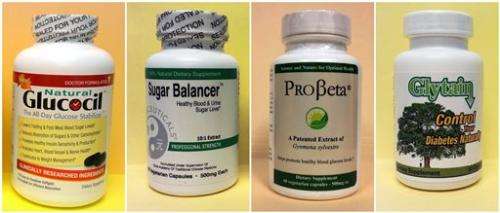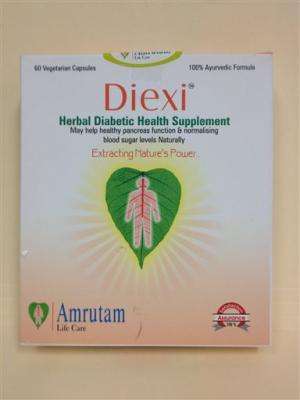This undated photo provided by The Food and Drug Administration (FDA) shows more four of the more than a dozen U.S. and foreign companies that market illegal treatments for diabetes, ranging from bogus dietary supplements to prescription drugs sold online without a prescription. The FDA sent warning letters to 15 companies ordering them to stop selling diabetes treatments which violate U.S. drug laws. ( AP Photo/FDA)
(AP)—The Food and Drug Administration is cracking down on more than a dozen U.S. and foreign companies that market illegal treatments for diabetes, ranging from bogus dietary supplements to prescription drugs sold online without a prescription.
All of the products aim to cash in on the country's diabetes epidemic, which affects nearly 26 million Americans. Regulators worry that consumers who buy such unapproved products could put off getting legitimate medical care, which could exacerbate heart disease, kidney failure and other deadly complications.
The FDA sent warning letters to 15 companies, both in the U.S. and abroad, ordering them to stop selling diabetes treatments which violate U.S. drug laws.
Three of the products targeted are marketed as "natural" supplements, but actually contain unlisted pharmaceutical ingredients. For example, Diexi, which is sold as a traditional Indian "herbal formula," actually contains metformin, the most common prescription drug used to treat diabetes. The product is sold by Amrutam Life Care, of Surat, India.
"Consumers should exercise caution before using products claiming to be herbal or all-natural alternatives to FDA-approved prescription drugs," the agency said in a statement Tuesday. "These products should be considered unsafe and should not be used."
This undated photo provided by The Food and Drug Administration (FDA) shows Diexi, which is sold as a traditional Indian "herbal formula," which actually contains metformin, the most common prescription drug used to treat diabetes. The product is sold by Amrutam Life Care, of Surat, India. The FDA sent warning letters to 15 companies, including Amrutam Life Care, ordering them to stop selling diabetes treatments such as Diexi which violate U.S. drug laws. ( AP Photo/FDA)
Other products include genuine dietary supplements that make unproven claims to treat or prevent diabetes. For example, Diabetes Daily Care is a capsule-based supplement containing cinnamon extract and other herbs. Its manufacturer, Nature's Health Supply Inc., claims it "safely and effectively improves sugar metabolism."
Under U.S. law, only FDA-approved medicines are permitted to make claims for treating or preventing disease.
Other companies targeted by the FDA run online pharmacies that sell prescription drugs for diabetes without a prescription. The FDA issued a warning letter to www.bestcheapmedsonline.com for marketing unapproved versions of diabetes drugs like Januvia, from Merck & Co. Inc.
The FDA warns patients against buying prescription medications on the Internet. Only 3 percent of online pharmacies actually comply with all U.S. pharmacy laws, according to a review by the National Association of Boards of Pharmacy.
The U.S. market for prescription diabetes drugs is the largest in the world, with sales of $22 billion last year. Sales have ballooned more than 60 percent in the last four years from $13.6 billion in 2008, according to health data firm, IMS Health.
The FDA said it has not received any reports of injury or illness connected with the products, but is taking action as a precautionary measure.
© 2013 The Associated Press. All rights reserved.






















